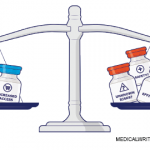In Canada, a subcutaneous formulation of CT-P13, which is biosimilar to infliximab, was approved to treat rheumatoid arthritis.


In Canada, a subcutaneous formulation of CT-P13, which is biosimilar to infliximab, was approved to treat rheumatoid arthritis.

Results from a one-year study suggest subcutaneous CT-P13, which is biosimilar to infliximab, is as safe and effective for RA patients as intravenous (IV) CT-P13 and IV infliximab…
Reuters Staff |
NEW YORK (Reuters Health)—About two-thirds of patients with ulcerative colitis (UC) had mucosal healing by the end of induction treatment with the infliximab biosimilar CT-P13, according to results of the first prospective study to evaluate this. CT-P13 is the first biosimilar monoclonal antibody of reference infliximab (Remicade) approved in Europe and several other countries where…

Bryn Nelson, PhD |
As useful stand-ins for biologics targeting a range of inflammatory diseases, biosimilars have made significant inroads across Europe as less expensive alternatives. Denmark, for example, realized a cost savings of 64% after instituting a mandatory national switch from the originator infliximab to its biosimilar counterpart. In the U.S., however, a considerably smaller fraction of rheumatologists…

Subcutaneous CT-P13 (Remsima SC), biosimilar to infliximab, will soon be available in the E.U. to treat adults with rheumatoid arthritis…
Will Boggs MD |
NEW YORK (Reuters Health)—Patients with inflammatory bowel disease (IBD) can safely switch from infliximab to the biosimilar CT-P13, though they may face a higher risk of clinical relapse, researchers from Spain report. Recent studies have demonstrated the effectiveness and safety of infliximab biosimilars in patients with IBD, but there are limited data about the effectiveness…

Shikha Mittoo, MD, MHS, FRCPC |
A typical patient with a rheumatic disease needs a multifaceted treatment approach to address comorbidities, minimize disability, promote quality of life and improve survival. To achieve these outcomes, rheumatology research has evolved from examining a single treatment to studying the best treatment approaches. Examples of these strategy trials include how to best combine pharmaceutical therapies,…

AMSTERDAM—As more biosimilar drugs for rheumatic diseases make their way to market, evidence is growing that switching from the originator drug to a biosimilar tends to be effective, while the questions of switching back and forth, and switching multiple times using several different biosimilars, remain to be answered, an expert on the topic said at…

SAN DIEGO—Should patients with rheumatic diseases switch from a biologic to its biosimilar? At the 2017 ACR/ARHP Annual Meeting’s Great Debate, held Nov. 5, two rheumatologists argued whether to switch or stay put based on safety, efficacy and potential cost savings. First to the podium to make the case for switching, Jonathan Kay, MD, tweaked…

In a 78-week study examining the interchangeability of infliximab with the biosimilar SB2, the treatments demonstrated long-term efficacy, safety and immunogenicity in patients with rheumatoid arthritis. Across all the study’s treatment groups, patients had similar treatment response rates, and the long-term clinical profile of SB2 was comparable with infliximab…